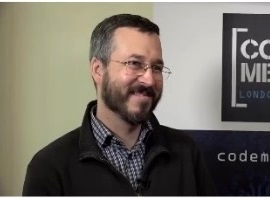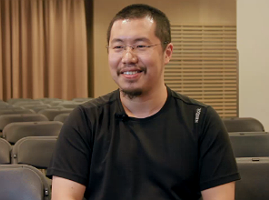InfoQ Homepage Actors Content on InfoQ
Interviews
RSS Feed-
Darach Ennis on the Pony Language, Actors, Concurrency
Darach Ennis talks about the actor-model language Pony, its distinguishing approaches to memory management and concurrency, how it relates to Erlang, and much more.

-
Sylvan Clebsch on the Actor-Model Language Pony, Garbage Collection, Capabilities, Concurrency
Sylvan Clebsch introduces Pony, a language built on the actor model which combines new approaches to garbage collection and concepts like capabilities to write high performance, concurrent code.

-
Caitie McCaffrey on Scaling Halo 4 Services, the Orleans Actor Framework, Distributed Programming
Caitie McCaffrey talks about scaling game backend services for Halo 4 and others, stress & performance testing, the Orleans actor framework, and the future of distributed programming.

-
Yan Cui on Graph Databases for Modeling Game Economies, Actors and DSLs with F#
Yan Cui talks about the advantages of using F# to build DSLs and using the actor model. Also: why and how to use graph databases to model (game) economies.

-
Omer Kilic on Erlang, Using the Actor Model for Embedded Systems, Raspberry Pi
Omer Kilic explains the use of Erlang for embedded systems and how Actors help to model hardware components and concurrency aspects. Also: the work on using Erlang to program the Raspberry Pi.

-
Jonas Bonér and Kresten Krab Thorup on Bringing Erlang's Fault Tolerance and Distribution to Java with Akka and Erjang
Jonas Bonér and Kresten Krab Thorup discuss some key aspects of Erlang like fault tolerance and reliability and how the Akka and Erjang projects try to bring them to the JVM.

-
Jonas Bonér on Akka, Actors and Shared State, STM, Typesafe
Jonas Bonér explains the Akka project and the types of actors it offers as well as its transactional features. Also: a preview of how Akka 2.0 changes the management of (remote) actors.

-
Francesco Cesarini and Simon Thompson on Erlang
Francesco Cesarini and Simon Thompson discuss how Erlang's design allows fault tolerance and resilience, modular error handling, details of the actor model implementation and distributed programming.

-
Nick Kallen Discusses Scala at Twitter
Nick Kallen from Twitter is interviewed by Randy Shoup about Twitter’s use of the Scala programming language. Nick discusses using Scala to build high-performance and scalable network services (including FlockDB), the powerful dualism of Scala which combines the best of object-oriented and functional approaches and also provides his views on the tradeoffs between static and dynamic languages.

-
Kresten Krab Thorup Discusses Programming Languages, Concurrency and Integration
Kresten answers questions about current programming languages and problems they solve. He also tries to look at what is missing for addressing issues we face today such as concurrency. He discusses its importance and tries to portray the language that would take us to the next level helping to tackle these issues easily.

-
Ralph Johnson, Joe Armstrong on the Future of Parallel Programming
Ralph Johnson and Joe Armstrong discuss their ideas about parallel programming - whether shared memory is harmful, the place of message passing, fault tolerance, the importance of protocols and more.

-
Ruby Creator Yukihiro "Matz" about Ruby, Functional Programming and Programming Languages Design
In this interview, Yukihiro Matsumoto talks about programming languages design and decisions he had to take while designing Ruby. He also discusses other programming languages including Haskell, Scala, Python and Clojure. While talking about Ruby language and functional programming, Matz explores opportunities of integrating some of FP into Ruby and imagines a purer IO approach for it.
